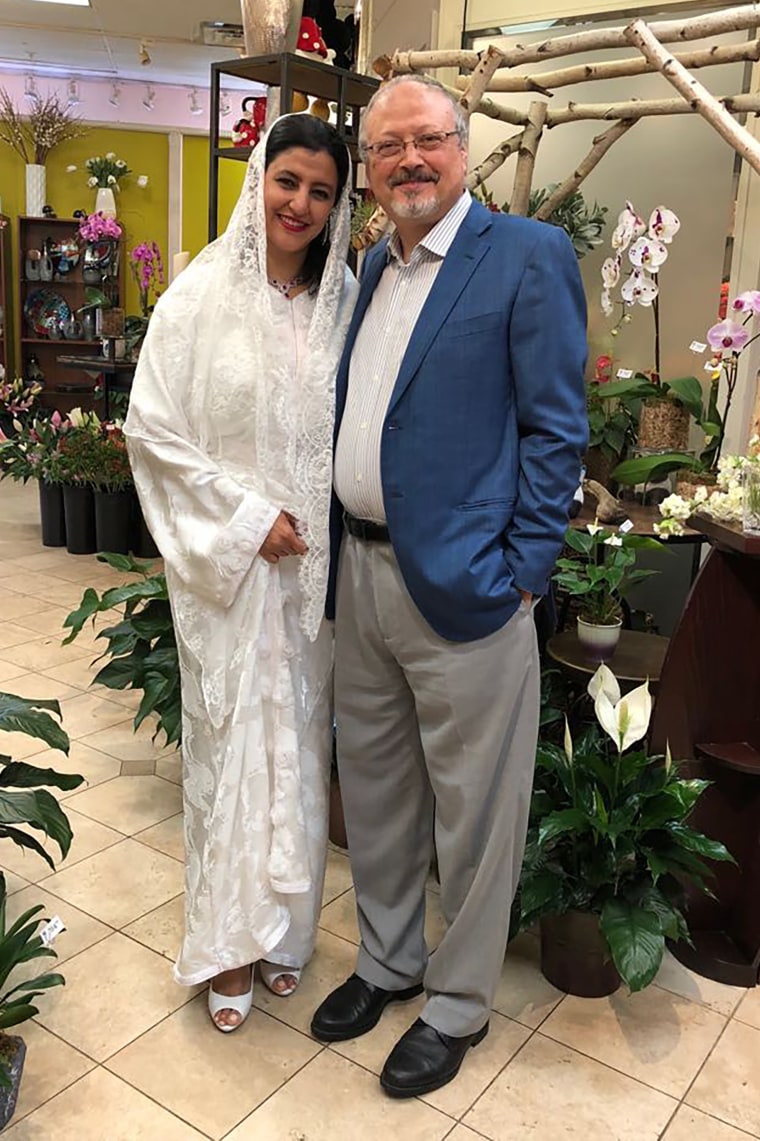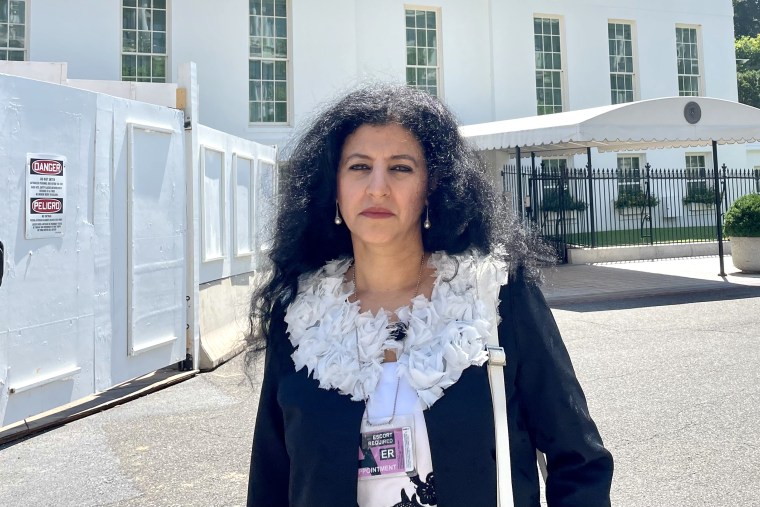[ad_1]
Saudi journalist Jamal Khashoggi’s widow has asked the U.S. government and United Nations to intervene and help her recover her husband’s electronic devices from the Turkish government so she can take legal action before the statute of limitations runs out later this year, according to letters, papers and other details about her efforts shared with NBC News.
It’s been more than a year since Hanan Elatr Khashoggi first requested the laptop, tablet and two cellphones of the late Washington Post columnist who was killed at the Saudi consulate in Istanbul in 2018, and she’s now hoping to increase pressure on Turkey to comply by getting help from Director of National Intelligence Avril Haines and U.N. Secretary-General Antonio Guterres.
The letters, sent in November and January respectively, say that she believes the devices “will reveal previously undisclosed details about my husband’s murder that are critical to knowing the full truth.”
“I have the right to receive all of his (Jamal Khashoggi’s) possessions, particularly now as I am embarking on legal action in the United States against all parties responsible for my husband’s murder,” Hanan Elatr Khashoggi wrote in both letters, naming NSO Group, an Israeli cyber-intelligence firm, and the Saudi and Emirati governments as planned targets of future lawsuits.
She said Turkey recovered the devices shortly after her husband’s death and wrote in her letters that her personal appeals to Turkish President Recep Tayyip Erdogan for the phones, laptop and tablet “have not been honored.”
Erdogan’s office and the Turkish Embassy in Washington, D.C., did not respond to a request for comment. The Turkish Embassy sent Hanan Elatr Khashoggi’s attorney a letter in December 2021 that suggested that she send “her request to the respective Turkish courts through appropriate legal channels.”
Hanan Elatr Khashoggi, who is an Emirati, said she cannot pursue legal action in Turkey because she is in the U.S. under political asylum, does not have a passport and does not have the necessary finances.
Jamal Khashoggi’s devices are “so important and so vital,” she said in an interview — a point emphasized by her lawyer Randa Fahmy — to knowing what led to Jamal Khashoggi’s death and holding all responsible parties to account.

Hanan Elatr Khashoggi discovered in November 2021 that cyber-intelligence firm NSO Group’s Pegasus spyware had been installed on her two Android phones without her knowledge when she was in the United Arab Emirates months before her husband’s death. That discovery was confirmed by a digital forensic analysis performed by Citizen Lab, reviewed by NBC News and first reported by The Washington Post. She believes this same spyware may be on her husband’s devices as well.
It was the spyware’s discovery that started the clock on her ability to take legal action. She has two years to file her case since its detection, according to the Computer Fraud and Abuse Act. That window ends in November of this year.
Hanan Elatr Khashoggi contends that Saudi Arabia, the UAE and NSO Group’s alleged surveillance of the couple all contributed to the death of Jamal Khashoggi and she intends to file three separate lawsuits against them in U.S. courts. She believes that finding similar spyware on her husband’s devices will support her cases.
“It is not only Saudi Arabia that is guilty,” she told NBC News, referring to her husband’s death. “There are many who are guilty, and we have a right to know and bring them to justice.”
Saudi Arabia and the UAE did not respond to requests for comment. NSO Group has denied any involvement.
“NSO has repeatedly stated that our technology was not associated in any way with the heinous murder of Jamal Khashoggi or any of his family members, including Hanan Elatr,” an NSO Group spokesperson said.
Hanan Elatr Khashoggi’s letter to Haines was sent to the director of national intelligence’s chief of staff Charles Luftig via email on Nov. 2, 2022, and he confirmed receipt of the message a day later, according to emails reviewed by NBC News. The letter was originally sent to the agency in September, but she did not receive a reply.
Fahmy, Hanan Elatr Khashoggi’s attorney, said that by happenstance she ran into Haines at the State Department on Nov. 4 at the swearing-in ceremony for the new U.S. ambassador to Morocco, Puneet Talwar. Haines told her that she had read the letter and was discussing the request with the Justice Department, according to Fahmy.
“I said, ‘We really need those devices,’” the attorney recalled. “She said, ‘You’re going to get a formal response, but I will tell you that I am talking to the Justice Department if a request like this can be made.’”
Fahmy said she had not heard back from the Office of the Director of National Intelligence since November. A spokesperson for the Office of the Director of National Intelligence declined to comment. The Justice Department did not respond to a request for comment.
The letter to the U.N. secretary-general’s office was sent on Jan. 30. Farhan Aziz Haq, a spokesperson for the office, confirmed they had received it and said that “it’s being studied now.”
‘I have to continue and bring justice’
The first legal case Hanan Elatr Khashoggi said she intends to file in U.S. court is against Saudi Arabia with criminal and civil claims over the killing of her husband, despite the Biden administration’s decision that Saudi Crown Prince Mohammed bin Salman has sovereign immunity in his role as Saudi Arabia’s prime minister.
The Office of the Director of National Intelligence previously concluded that the crown prince had approved the killing of Jamal Khashoggi, a columnist for The Washington Post critical of the Saudi government, according to a report from Haines’ office that she declassified in February 2021. The report also named 18 other individuals involved in his death.
Hanan Elatr Khashoggi and Fahmy believe that they have a strong standing to build a case and aim to target those named individuals, not just the crown prince. While Fahmy admitted “there’s nothing we can do about the Biden administration findings on sovereign immunity,” she believes there are other avenues for the two to explore and noted that “there are exceptions to sovereign immunity” that she is willing to test.
The Biden administration has not imposed any severe penalties on Saudi Arabia for Jamal Khashoggi’s death though the president has said he will hold the country and its leaders to account for the journalist’s killing. The National Security Council — which had previously met with Hanan Elatr Khashoggi, who disclosed her efforts to recover her husband’s devices in the meeting — did not respond to a request for comment.

The second case would target the United Arab Emirates, where Hanan Elatr Khashoggi once resided and worked as a flight attendant. She believes they installed the NSO Group spyware on her devices when she was detained by UAE intelligence agents at the Dubai International Airport in April 2018. She gave them her phones and was blindfolded, cuffed and interrogated at a separate location about her husband, she said.
She believes the Emiratis are implicated in Jamal Khashoggi’s death because they may have provided tracking information through an intelligence sharing agreement the country had with Saudi Arabia.
“They misused this to track Jamal through me,” Hana Elatr Khashoggi said. “They knew how vital that relationship between me and Jamal was because we were sharing everything.”
Finally, she intends to sue NSO Group. She and Fahmy believe that the same spyware could be on Jamal Khashoggi’s phone and that NSO Group was involved in the software’s upkeep on all their devices.
The firm is already facing other legal battles, as the Supreme Court allowed Meta to pursue a lawsuit against NSO Group last month for allegedly installing spy software on its WhatsApp messaging app to surveil numerous people, including journalists and activists, according to court documents. NSO Group has said it installed the software on the behalf of an unnamed foreign government.
Hanan Elatr Khashoggi said that her life has not just changed because of her husband’s death — “my life is finished.” But that view has kept her dedicated to her husband’s case.
She lost her career as a flight attendant, her social circle in the U.S. comprises five people and she is in constant fear for her life. At her new job in Washington, D.C., she earns just enough to pay for a room and to feed herself.
“I’m the second victim after Jamal,” Hanan Elatr Khashoggi said. “Jamal, he lost his life and I lost my life as well, but I can speak about him and this gives me courage. I have to continue and bring justice to him.”
[ad_2]
Source link
